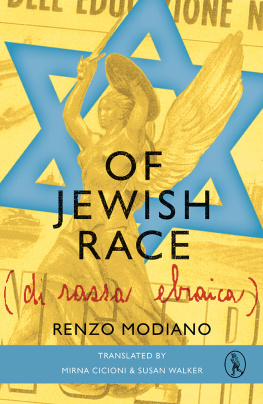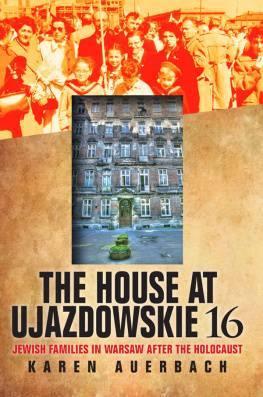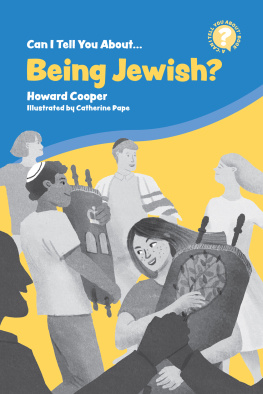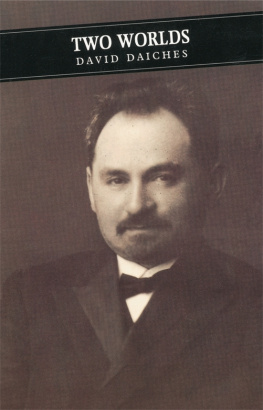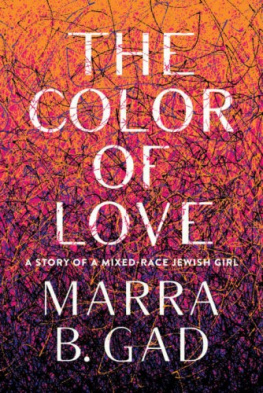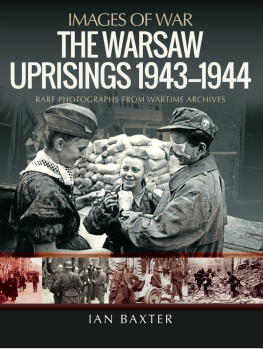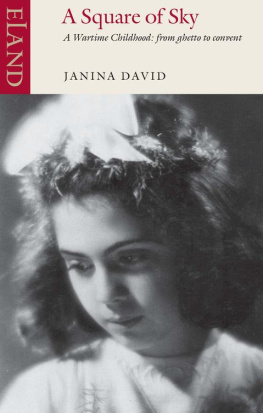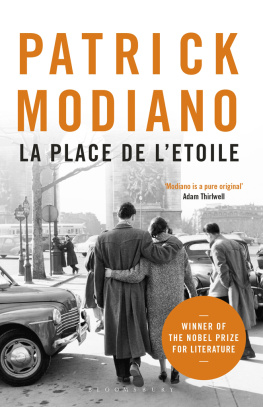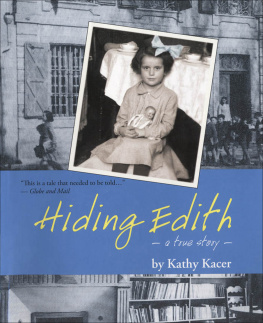In memory of all the children torn from their homes in Rome on the 16th of October 1943
I would like to acknowledge the silent unselfish people who at great risk, possibly of their lives, allowed my family to survive. They never asked for anything, they havent claimed recognition or rewards; they appeared at the worst time in my life, picked me up and rescued me and, once their mission was accomplished, retreated into the background.
My gratitude is a given, but I would like these exceptional people to read their names in the pages of this book.
Everything a mans blood absorbed from the air around him in childhood remains within him.
CHAPTER 1
Rome, the 8th of September 1943. I was playing hopscotch in the street with some other children, when I saw my mother coming. She had a strange expression on her face, which was lit up by a glow of serenity that I had never seen before. Her shortsighted eyes, usually soft and languid, were filled with emotion.
Mamma always walked fast, so it wasnt the speed at which she was coming towards me that made me stop it was that particular expression on her face.
She grabbed my hand and dragged me away, without a thought for my stunned playmates. Whilst I struggled along behind her through the oppressive late-afternoon heat, she said, Hurry up! Were going home. The war is over!
I was speechless. That news was much more than a mere surprise. Running along by her side I repeated over and over, The wars over. The wars over I was not quite seven years old and could not understand anything that went beyond my own here and now. I had an inkling that a lot of things around me were about to change, but I could only think about what the changes would mean for me. What was I going to do tomorrow? The end of the war was supposed to be a good thing, but how did a war finish that had started before I could remember?
I hadnt been separated from my father, because being a Jew, he had been deemed unworthy of wearing a soldiers uniform. So what could the end of the war mean? Not my father coming home, as was going to be the case for many of my friends. I suddenly had a thought: they would give us our wireless back. Two plain-clothes policemen had taken it away because we Jews werent allowed to have one. The end of the war would at least mean that. I lingered over the pleasant prospect, because I had really missed that magical box, which had given me so much to dream about in the short time wed owned it.
Thoughts come and go quickly, and the way home was long enough for new ones to pop up. War had forever been hanging over our lives. Everyone felt its effects, and the grown-ups talked of nothing else. It permeated everyones existence: that was why I couldnt grasp the full meaning of its end. I tried to think of other things, but it kept flooding back into my mind, whilst I barely managed to keep up with my mother, who was in more of a hurry than usual that evening.
Im sure that she would have spoken to me on the walk home, but I cant remember what she said. I kept wondering what peace was like, but I didnt know what it was and had trouble imagining it.
They wont bomb us anymore, I remember suddenly thinking. I liked the idea, but my pleasure was rather superficial, because I had never really grieved for the victims. The notion I had of them was blurred and only a little more real than my idea of those soldiers who had been killed on the frontline.
Rome had been the target of two heavy air raids, but the bombs hadnt fallen very close to my building. The warning sirens had sounded frequently and wed often had to run to our air-raid shelter. Going down into that damp cellar had been a diversion and hadnt frightened me. After all, I didnt go on my own, and for a child its difficult to envisage his home collapsing on top of him whilst hes in his parents arms. I did hate nighttime alarms, though, because they broke my nights sleep. Those raids made me detest the British, because Id learned that it was their planes that flew at night. The Americans were braver and made their raids in broad daylight. A few times, from the balcony of our flat, I had watched the planes surrounded by puffs of white cloud from the anti-aircraft guns. But the show was usually short-lived, because every single time, my mother would drag me away from my lookout, turning a deaf ear to my protests.
After the two major bombing raids and other less damaging ones along the railway line near our neighbourhood, a curious trade sprang up amongst us children: we found and exchanged bomb shards. They were nearly all so small that the whole lot of them could be held in the palm of your hand. But despite their size, they stayed warm for a long time and were still hot when we picked them up. Those fragments were evidence that the bombs had fallen close to our homes, that is to say, not too far from us, and that filled us with pride. The first time, we had come across them by chance, and were surprised at our find. From then on, as soon as we heard the mournful sound of the all clear, we rushed out to look for those hot, jagged pieces of metal. Handling them made us feel brave, because it meant that wed been close to where the bombs had fallen. According to our own peculiar ranking, the child who found the biggest fragment was the bravest, as if he had run the biggest risk in picking it up.
As I tried to imagine the end of the war, I also realised just how much it had been a mystery to me something Id given up trying to understand a long time ago and that Id relegated to a corner of my mind.
One day my parents took me along to have lunch with some friends. Were celebrating a victory, they said. But during the meal I gleaned from their conversation that in Africa that day it had been the British, not the Italians, who had won. At the time I was surprised, but didnt ask anyone for an explanation, not even my brother and sister, who were both a few years older than me. I didnt doubt my parents reasons, even though theyd just turned their backs on everything that Id sincerely believed in up to that moment.
I immediately decided that I would have to solve that mystery on my own, however big it might be. The method I used might not have been very scientific but it gave me more peace of mind. It was based on the certainty that Pap and Mamma were not traitors and therefore must have had very good grounds for thinking as they did. If the whole thing wasnt clear to me, this meant that it was too complicated for me to understand. In any case, I had absolute faith in their loyalty to the Fatherland (that was the word we used and believed in at the time). I had always heard them call Italy our Fatherland and say that everyone should love it. There was my mothers brother, Uncle Alberto, who had won a silver medal in the other war (I had been so envious of the scar on his chest and had often gone to sleep dreaming that I too, one day, would be wounded and, just like him, be presented with a silver medal by the King himself).
No one in such a family would betray the Fatherland! So it all meant that being loyal was a complicated matter. There had to be some truth, too, in the words I had so often heard: Children cant understand everything that goes on around them! There was another thing. Even though my parents had carefully avoided discussing politics while I was around, they hadnt been able to avoid letting something slip every once in a while the odd joke, for instance that showed that in their minds there was a difference between the Fatherland and Fascism. It was inevitable that this would happen, since both of them had been members of the Socialist Party for years and at home it was natural for everyone to say what they thought. So, from their occasional unguarded comments I had understood that Italy was one thing and Fascism, that governed it, was another. Even though I didnt know what govern meant. After that lunch, I got used to living with this strange contradiction, which was far from simple. I gave myself two rules: to listen to as much as I could and not to ask questions. Id realized that there were some things one mustnt talk about.

